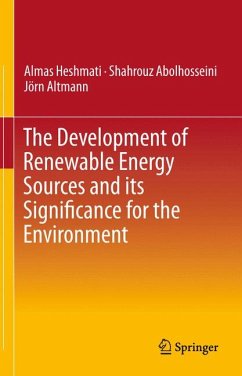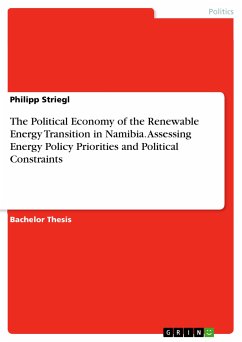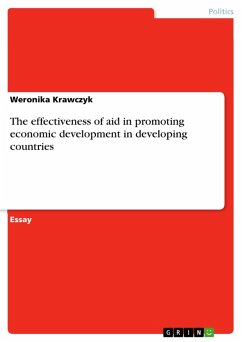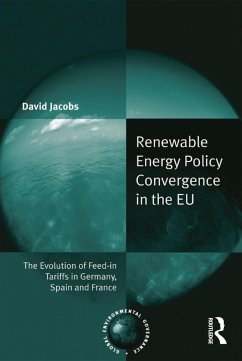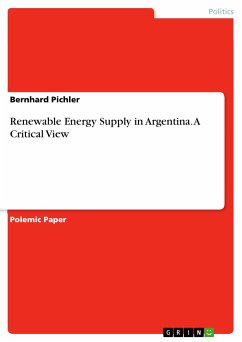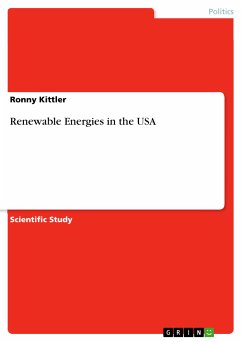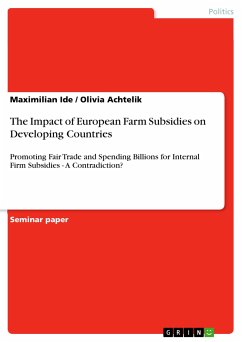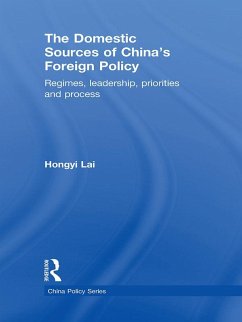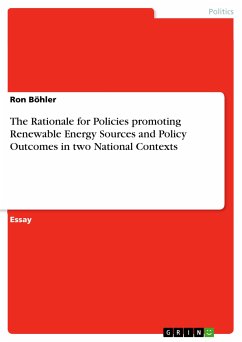
The Rationale for Policies promoting Renewable Energy Sources and Policy Outcomes in two National Contexts (eBook, PDF)
Sofort per Download lieferbar
Statt: 17,95 €**
15,99 €
inkl. MwSt. und vom Verlag festgesetzt.
**Preis der gedruckten Ausgabe (Broschiertes Buch)
Weitere Ausgaben:

PAYBACK Punkte
0 °P sammeln!
Essay from the year 2011 in the subject Politics - General and Theories of International Politics, grade: 1.7, University of Bath, language: English, abstract: The variety of renewable energy sources range from wind, sunlight, biomass and geothermal heat to rain, tides and waves (hydropower). Notwithstanding their massive importance for EU energy consumption, some energy carriers such as biomass and hydro are seen to be 'deadlocked' (Del Río Gonzaléz 2008, p.2917), while the promotion of wind power among EU member states is well researched. Hence, the case here shall be made for solar energy...
Essay from the year 2011 in the subject Politics - General and Theories of International Politics, grade: 1.7, University of Bath, language: English, abstract: The variety of renewable energy sources range from wind, sunlight, biomass and geothermal heat to rain, tides and waves (hydropower). Notwithstanding their massive importance for EU energy consumption, some energy carriers such as biomass and hydro are seen to be 'deadlocked' (Del Río Gonzaléz 2008, p.2917), while the promotion of wind power among EU member states is well researched. Hence, the case here shall be made for solar energy, with special reference to the promotion of photovoltaic (PV) power systems due to their suspected potential for further energy transitions in Europe. Being the 'fastest growing power-generation technology in the world' (REN21 2010, p.19), corresponding policy outcomes on the Iberian Peninsula will be illustrated and assessed. Rational policy-making aims at effective problem-solving strategies based on cost-benefit-calculations. Decisive is not which particular policy may in total terms maximize the outcome, but which one is optimal in relation to costs that accrue from this policy. The underlying question of rational choice theory thus is, why political decision-makers should prioritise a certain 'path' of policy-making over others. A rationale has thus always been assessed with regard to the effectiveness and efficiency towards a desired or intended political outcome. The Spanish and Portuguese National Renewable Energy Action Plans portray an adequate guideline for further analysis.
Dieser Download kann aus rechtlichen Gründen nur mit Rechnungsadresse in A, B, BG, CY, CZ, D, DK, EW, E, FIN, F, GR, HR, H, IRL, I, LT, L, LR, M, NL, PL, P, R, S, SLO, SK ausgeliefert werden.




